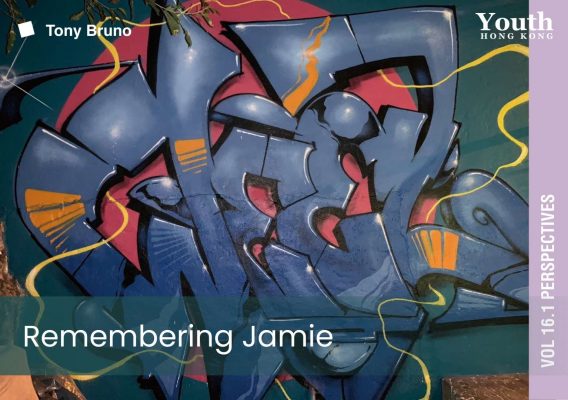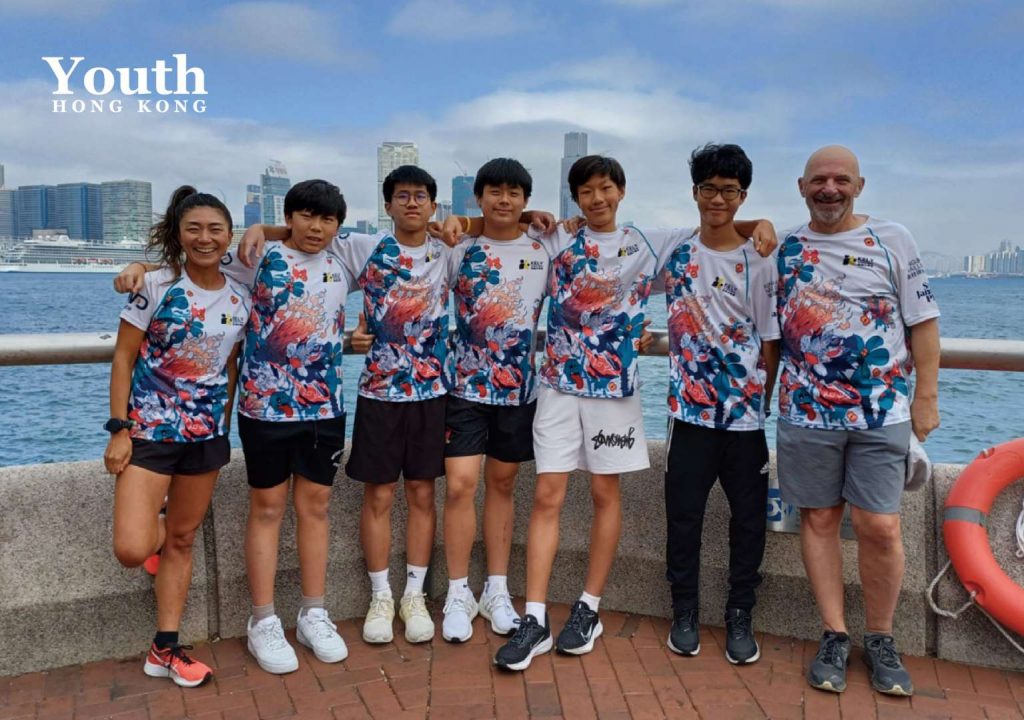//vol.16-1 Perspectives: Weez Walk
Remembering Jamie:
Let’s Talk About It, Just Like Sporting Injuries
In this intensely personal account, a father remembers his son.
by Tony Bruno
At a recent school workshop, my colleague asked a large group of Year 12 students whether they would tell their friends if they had broken a leg in a sporting incident and needed two weeks off school. A near unanimous response confirmed that they would, many feeling this was a “badge of honour.”
They were asked if they would tell their friends if they were depressed, feeling unable to cope and had stayed home for two weeks. The answer, as you can imagine, was the polar opposite, with most hands remaining down.
This is just one example that verifies the many statistics from research studies that indicate the significant severity of mental health issues among Hong Kong youth.
In a recent survey by KELY Support Group and GLG, over 50% of surveyed students showed signs of depression. A further survey by Psychiatry Research showed 17.5% of secondary school students had considered or ideated suicide, and 7.8% had made at least one attempt at suicide. Undocumented, but equally important, are the numerous cases where symptoms of stress, anxiety and depression are not recognised.
While these numbers are shocking and illustrate the scale of the problem, other surveys indicate that typically 50% of young people will not seek help and, most worryingly, 50% of responsible adults, be they parents, teachers or other caregivers, would not seek professional help despite the presentation of clinical symptoms.
The main reasons given for not seeking help are twofold. First, the genuine fear of stigma, and second, not knowing where and how to access help. Even when help is sought, the median time for a school age student to get access to a mental health professional is 18 months.
In February 2017, I received a call from the police, to say my son, Jamie, had been involved in an incident. A parents’ worst fears were realised when I learnt that he had taken his own life. My son was a remarkable 15-year-old: popular at school, a talented sports player and gifted artist. He was doing well at school, had made some plans and had everything to live for. The reasons for his actions were unfathomable. In later conversations with relatives, teachers, sports coaches, friends and peers, no one had any inkling of the problems he was experiencing, nor of his possible motivation for suicide.
Jamie’s mother and I needed to create something good and hopeful from this tragedy. So we formed The Weez Project: a group advocating for improved mental health awareness and provision, while also raising funds for programmes aimed at suicide prevention and better mental health outcomes in young people.
We created a series of events and campaigns, which include Weez Art, the creation of street artworks around Hong Kong designed to engage people in the conversation about mental health.
Our flagship event is Weez Walk, a 62 km walk around the coast of Hong Kong Island. Our intent with Weez Walk is to create a unique opportunity for participants to include antidotes to mental health, like embracing exercise, getting outdoors and being with friends, family and colleagues whilst talking about mental health. Weez Art is a key part of the walk, with art pieces visible at various points along the route.
We have held Weez Walk since 2021. Our first event consisted of myself and a few willing volunteers. This year we have seen over 800 people participate. It is clear from the conversations I have had with people on the route, that our campaign is gaining traction with more and more people talking about mental health. Hopefully, we are slowly but surely reducing the stigma associated with mental health problems and suicide.
However, our aims go much further. We are advocating for improvements in mental health provision, with significantly more resources and expertise. We are pushing for the full development and implementation of a mandatory mental health curriculum in all schools and institutes of higher education, provided for all students, teachers and other staff members.
We would like to see greater education programmes for parents and other caregivers, for sports coaches, language teachers and responsible adults involved in the care and development of our young people.
But overall, we aim to reduce and remove the stigma associated with mental health issues. To get people talking about their mental health, sharing stories, helping each other and seeking help where it’s needed.
We need mental health to be looked at and treated in the same way as physical health. Hopefully that means that when we next ask Year 12 students, they would talk to their friends about their depression or anxiety, and their response would be the same as their willingness to share their sporting injuries. ■
Tony is a co-founder of The Weez Project (www.weezproject.com), which aims to promote mental health and wellbeing among young people in Hong Kong. He is a board member of KELY Support Group serving the fundraising committee. Jamie was Tony’s beloved son.
References:
- Risk and protective factors in suicidal behaviour among young people in Hong Kong: A comparison study between children and adolescents
- CUHK announces survey results on the mental health of local child, adolescent and elderly populations
- Prevalence and correlates of suicidal behaviours in a representative epidemiological youth sample in Hong Kong: the significance of suicide-related rumination, family functioning, and ongoing population-level stressors




